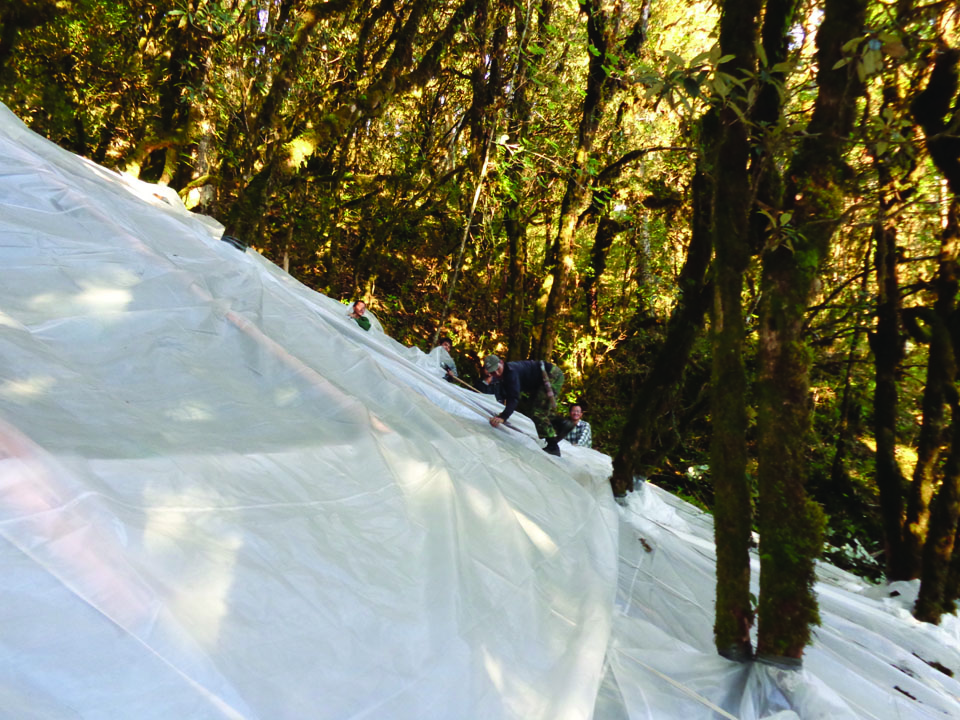How IUFRO’s Special Programme for Development of Capacities (SPDC) contributes to enhancing forest science communication within the framework of a Climate Change Adaptation Program in Bhutan.
Would you like to see your forest be wrapped up in plastic? Well, this is what Bhutanese society will witness due to a research project that aims at simulating drought, which may affect the region’s forests in the future as a result of climate change. In order to inflict drought stress on mature trees, entire research plots of considerable size have been covered with plastic roofs in about 2 m height above ground level, preventing rain water from reaching the soil and roots of trees. But would local people show understanding for such a measure and approve of it easily?
This is where forest science communication comes in. Transforming scientific knowledge and research results into useful information and guidance for policy-making has never been easy, neither at global nor at national and local levels. Recognising the need for enhancing science-society interactions, the Royal Government of Bhutan has agreed to include science communication and science/policy interfacing work in its newly established Climate Change Adaptation program.
Climate change in the Himalayan forests has been a focal area for the development and adoption of strategies in the Bhutan Government for some time. These strategies aim to increase the resilience of the Himalayan forests to climate change impacts such as species range shifts, changes in ecosystem services, catastrophic regime shifts and other altered disturbance regimes. Very steep, erodible terrain and low economic resilience contribute to the threats and future consequences of climate change that Bhutan’s forests and people will be faced with. Thus, building human capacities and knowledge base is much needed, as this will ensure the sustainability of efforts and inputs.
The Government of Bhutan, through its Renewable Natural Resources Research and Development Center Yusipang, Ministry of Agriculture and Forests, and the Austrian Ministry of Agriculture, Forestry and Environment, and Water Management, through the Vienna-based University of Natural Resources and Life Sciences, have been collaborating in forest research over the past 15 years. This successful cooperation has been extended through a comprehensive Climate Change Adaptation program called “Climate change adaptation potentials of forests in Bhutan – Building human capacities and knowledge base (BC-CAP)”.
The Special Programme for Development of Capacities (SPDC) of IUFRO contributes to this program by training Bhutanese forest scientists, Government officials and other relevant stakeholders in the effective dissemination and uptake of scientific knowledge in the field of climate sensitive forestry and land use. The support of IUFRO-SPDC includes two training workshops on science-policy interfacing and science communication.
A first workshop entitled “Working effectively at the interface of forest science and forest policy” was successfully held in Thimpu, Bhutan on October 22-24, 2013. Forestry officers from the Bhutanese Ministry of Agriculture and Forests, forest department, forest development corporation and NGOs attended the workshop with the objective of gaining knowledge and skills in science-policy interfacing through hands-on exercises, lectures on concepts and methods and presentation of best practices. The training workshop aimed to improve the understanding of key stakeholders in policy and decision-making and highlighted the important role of scientists in contributing information to these processes.
By applying the knowledge of how to work and effectively communicate at the science-policy interface, the Bhutanese society will be better informed about on-going climate change research and, thus, show greater understanding for the measures taken in the course of the project, including the plastic roofs established in their forests.
For further information on the IUFRO –SPDC training course, please visit: http://www.iufro.org/science/special/spdc/actproj/wsbhutan/


Leave a Reply